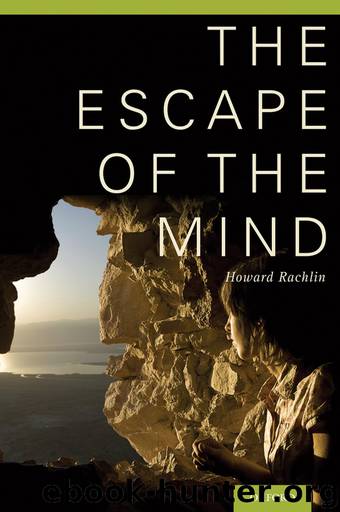The Escape of the Mind by Rachlin Howard

Author:Rachlin, Howard
Language: eng
Format: epub
Publisher: Oxford University Press, USA
Published: 2014-03-11T04:00:00+00:00
Note that you will maximize the money you receive by not putting any money in the box. Then you will take home the original $100 you kept plus what the experimenter distributes after doubling whatever money was in the box. HOWEVER: If everybody kept all $100, nothing would be in the box and each person would take home $100, whereas if everybody put all $100 in the box, each person would take home $200 after the money in the box was doubled and distributed.
Donation amount in this “one-shot” public goods game is a measure of altruism. As the instructions emphasize, an individual participant gains nothing at all by contributing on the present occasion. Even if everyone else makes the full altruistic choice, any one person loses by contributing. Similarly, individuals gain virtually nothing by their individual $50 contribution to public television (the same programs would be programmed with or without any particular $50 contribution), but people do give money to public television. Jones found a significant negative correlation between the amount of money participants said they would put into the box and their k-value in the social discounting test. In other words, the more money a person donates to the public good, the shallower that person’s discount function tends to be.
According to the economist Julian Simon (1995):
The conceptual framework employed here obviates the age-old question about whether an act of giving by one individual to another should properly be labeled “altruism,” or whether instead one is “really” being “selfish” by making oneself feel good. An individual’s discount weights vis-à-vis other individuals may be considered a full description of the individual in this connection, assuming that the individual’s behavior corresponds to his or her discounts in relation to other individuals . . . . Revealed preferences constitute the entire system. (pp. 375–376)
The concept revealed preferences refers to an ability to derive functions such as Equation 8.1 from observations of behavior (behavior “reveals” the preferences), and then to use that function to predict behavior in some other situation (such as the public goods game). Correspondingly, the finding that behavior in a public goods game may be predicted by steepness of a social discount function is itself a defining property of altruism. The more such correspondences are found, the richer the behavioral and economic conception of altruism becomes.
Moreover, the correspondences and parallels between altruism and self-control should serve, as Simon said, to demystify altruism. Whereas it may seem self-evident that people will sacrifice some part of their present good for the benefit of their future selves, it seems mysterious when people sacrifice some part of their own good for the benefit of another person. Yet, as Simon implies, as the philosopher Derek Parfit’s “reductionism” implies, and as our experiments show, the two forms of sacrifice are equally explicable in economic terms. [A person has common interests with other people close to him, just as he has common interests with his later self. Ainslie (2001) has stated that trade-offs, described in terms of willingness to delay a reward, may occur between P 0 and P 1 , P 2 ,.
Download
This site does not store any files on its server. We only index and link to content provided by other sites. Please contact the content providers to delete copyright contents if any and email us, we'll remove relevant links or contents immediately.
| Administration & Medicine Economics | Allied Health Professions |
| Basic Sciences | Dentistry |
| History | Medical Informatics |
| Medicine | Nursing |
| Pharmacology | Psychology |
| Research | Veterinary Medicine |
The Art of Thinking Clearly by Rolf Dobelli(10467)
The 5 Love Languages: The Secret to Love That Lasts by Gary Chapman(9798)
Mindhunter: Inside the FBI's Elite Serial Crime Unit by John E. Douglas & Mark Olshaker(9329)
Becoming Supernatural by Dr. Joe Dispenza(8209)
Nudge - Improving Decisions about Health, Wealth, and Happiness by Thaler Sunstein(7697)
The Road Less Traveled by M. Scott Peck(7599)
Mastermind: How to Think Like Sherlock Holmes by Maria Konnikova(7331)
Enlightenment Now: The Case for Reason, Science, Humanism, and Progress by Steven Pinker(7309)
Win Bigly by Scott Adams(7186)
The Way of Zen by Alan W. Watts(6608)
Factfulness: Ten Reasons We're Wrong About the World – and Why Things Are Better Than You Think by Hans Rosling(4738)
The State of Affairs by Esther Perel(4714)
Gerald's Game by Stephen King(4644)
Man's Search for Meaning by Viktor Frankl(4591)
The Confidence Code by Katty Kay(4252)
Thinking in Bets by Annie Duke(4220)
The Healing Self by Deepak Chopra(3568)
Hidden Persuasion: 33 psychological influence techniques in advertising by Marc Andrews & Matthijs van Leeuwen & Rick van Baaren(3561)
The Worm at the Core by Sheldon Solomon(3486)
